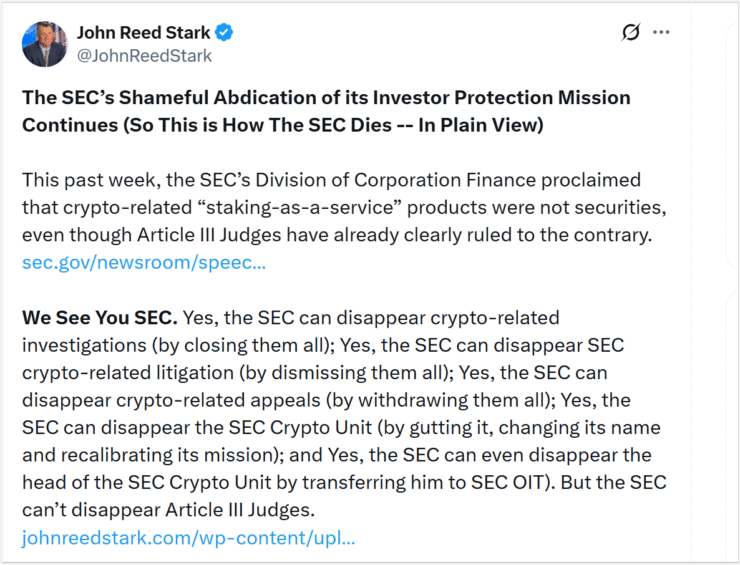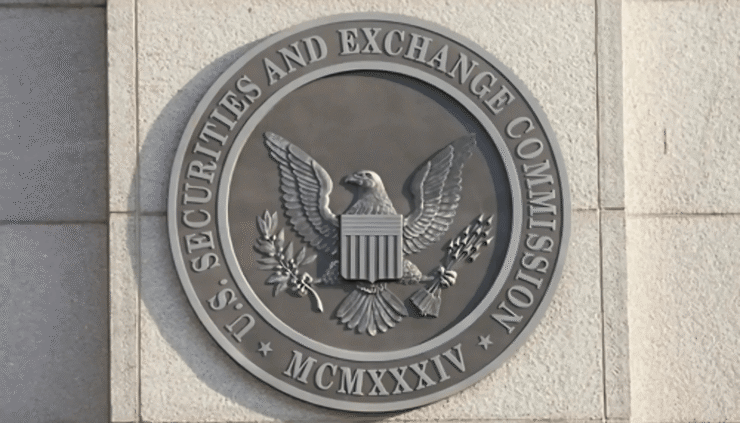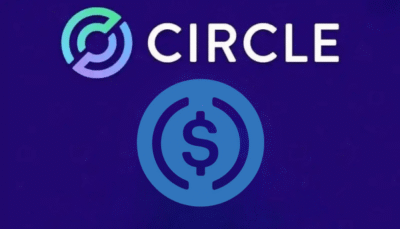The U.S. Securities and Exchange Commission (SEC) is under fire following a dramatic shift in its stance on crypto staking. In a May 29 update from its Division of Corporation Finance, the agency suggested that some staking services may not qualify as securities—potentially exempting certain proof-of-stake offerings from registration under the Securities Act.
The change has triggered widespread skepticism, both inside and outside the agency. Former SEC Internet Enforcement Chief John Reed Stark sharply criticized the update, claiming it contradicts years of enforcement precedent. Stark pointed to recent court rulings in cases against Binance and Coinbase, where judges allowed claims that crypto staking products met the Howey test definition of securities.
In a heated post on X (formerly Twitter), Stark declared, “This is how the SEC dies – in plain view,” calling the move a “shameful abdication” of the agency’s duty to protect investors.
Legal observers warn that the guidance may be legally inconsistent with earlier court decisions, potentially undermining the SEC’s enforcement foundation in ongoing and future cases. The shift has added further uncertainty to an already murky regulatory environment for digital assets in the U.S.

Dismissed Cases and Internal Dissent Deepen the Controversy
The controversy over staking regulation has intensified as the SEC’s prior enforcement efforts unravel. In May 2025, the agency’s high-profile lawsuit against Binance—which alleged that its staking program was an unregistered securities offering—was dismissed with prejudice, permanently preventing similar charges from being refiled.
A parallel case against Coinbase, once upheld by a judge in March 2024, was dropped in February 2025, signaling a broader recalibration in the SEC’s crypto strategy.
Adding to the internal discord, Commissioner Caroline Crenshaw issued a pointed statement on May 29 distancing herself from the staff’s updated position. She criticized the guidance as legally unsound and inconsistent with decades of case law.
“The staff’s analysis may reflect what some wish the law to be, but it does not square with the court decisions on staking and the longstanding Howey precedent,” Crenshaw stated.
She further accused the agency of adopting a “fake it till we make it” mentality—shaping policy based on aspirations rather than enforceable legal standards.
Mixed Signals Undermine Confidence in SEC’s Crypto Oversight
The SEC has recently shown signs of softening its approach to digital assets—closing investigations, dismissing lawsuits, and engaging in dialogue with industry stakeholders. While the agency describes these actions as part of an effort to bring clarity, critics argue they reflect a dangerous inconsistency.
John Reed Stark doubled down on his criticism, labeling the SEC’s recent moves a “crypto-deregulatory blitzkrieg” that he claims has “destroyed a once-proud 90-year legacy.”
Commissioner Crenshaw echoed these concerns on June 2, pointing to the agency’s contradictory treatment of crypto assets like Ethereum (ETH) and Solana (SOL).
“How is it that these crypto assets are supposedly not securities when it comes to registration requirements, but conveniently are securities when a registrant sees an opportunity to sell a new product?” she asked.
At the Bitcoin 2025 conference in Las Vegas, Commissioner Hester Peirce offered a contrasting view. She emphasized that it’s not the asset itself, but how it is sold that determines if a transaction qualifies as a securities offering.
“Most crypto assets, as we see them today, are probably not themselves securities,” Peirce said.
“That doesn’t mean you can’t sell a token in a way that makes it a securities transaction. That’s where the real clarity is needed.”
Quick Facts
- The SEC’s May 29 guidance suggests some crypto staking services may not be securities, reversing earlier enforcement positions.
- Former SEC official John Reed Stark called the move a “shameful abdication” and legal analysts warn it may conflict with past court rulings.
- Cases against Binance and Coinbase regarding staking have been dismissed, highlighting internal inconsistencies in the agency’s approach.
- Commissioners Caroline Crenshaw and Hester Peirce remain publicly divided on how staking and crypto tokens should be regulated.





